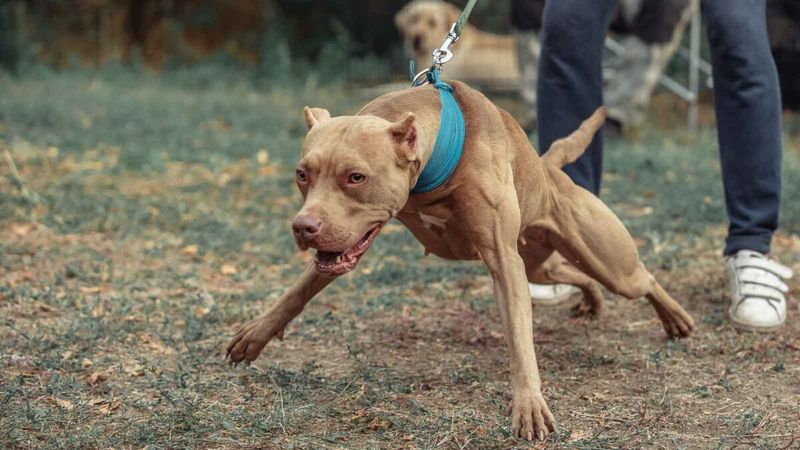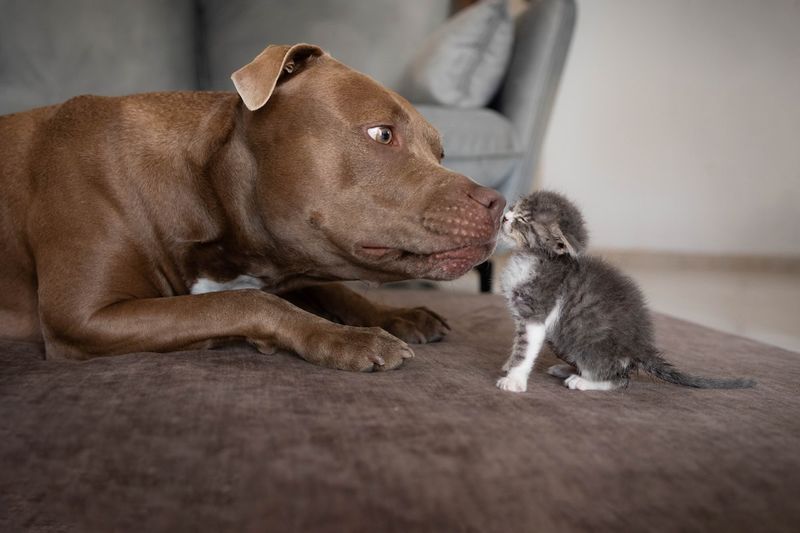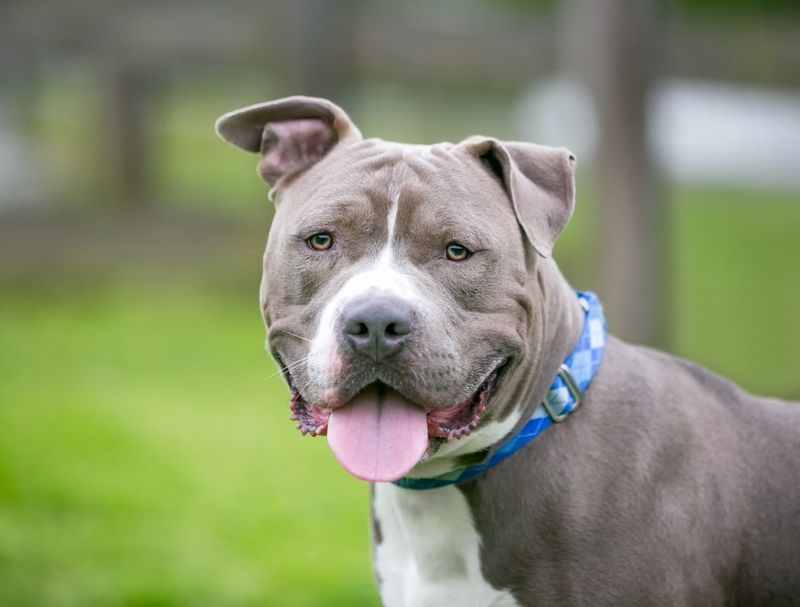Pit Bulls are often painted in the worst light, but the truth is, these dogs are far from the fearsome creatures many believe them to be. Misunderstood and unfairly judged, they’ve become victims of widespread myths and stereotypes.
It’s time to set the record straight. These loyal, loving, and protective companions deserve better than the harsh reputation they’ve been handed. They’re not the dangerous animals the media makes them out to be. In fact, when properly raised and cared for, they’re some of the most affectionate dogs you’ll ever meet.
Ready to break free from the misconceptions? Let’s take a closer look at 16 common myths about Pit Bulls and expose the truth. Get ready to see these dogs in a whole new light!
Myth: Pit Bulls are naturally aggressive

The belief that Pit Bulls are inherently aggressive is one of the most persistent myths. In reality, aggression in dogs is more often a result of upbringing and environment rather than breed.
Pit Bulls, like any other dogs, can be gentle and affectionate, especially when raised in a loving home. Their reputation for aggression is largely due to media sensationalism and misuse by irresponsible owners.
It’s crucial to recognize that every dog is an individual, and with proper training and socialization, Pit Bulls can be as friendly and lovable as any other breed.
Myth: Pit Bulls have lockjaw

A common misconception is that Pit Bulls possess a unique ability to lock their jaws. Scientifically, this is false. Pit Bulls’ jaw structure is no different from any other dog breed.
The myth likely stems from their tenacity and strength, often observed in work or play. Understanding this helps to dispel unnecessary fear about their nature. In reality, their bite mechanics are typical of any dog.
Education about their physical traits is essential to correcting myths. Promoting accurate information helps in reshaping public perception, paving the way for these dogs to be seen more positively.
Myth: Pit Bulls are not good family pets

Many believe Pit Bulls can’t be trusted around children or in family settings. On the contrary, they can be excellent family pets. Known for their loyalty and protective nature, they often form strong bonds with family members.
When socialized properly, Pit Bulls are gentle and patient, making them great companions for children. Families with Pit Bulls often report that these dogs are loving and playful, contrary to the negative stereotypes.
It’s important to judge dogs on their behavior and not their breed. These dogs thrive in a nurturing family environment, showcasing their true loving nature.
Myth: Pit Bulls are only used for fighting

The image of Pit Bulls as fighting dogs has overshadowed their abilities and potential. Historically, they were bred for various roles, including herding and as loyal companions.
Today, they excel in sports, therapy work, and as service dogs. Their intelligence and eagerness to please make them versatile and trainable in different arenas. It’s crucial to highlight these positive attributes and not pigeonhole them based on past misuse by humans.
By recognizing their talents beyond fighting, we can appreciate the full spectrum of their capabilities and encourage a broader acceptance of the breed.
Myth: All Pit Bulls are the same

Many assume all Pit Bulls are identical in temperament and appearance, but this isn’t true. The term “Pit Bull” encompasses several breeds, including the American Pit Bull Terrier, Staffordshire Bull Terrier, and American Staffordshire Terrier, among others.
Each has distinct characteristics and temperaments. Even within the same breed, individual dogs have unique personalities. This diversity means they can’t be generalized under a single stereotype.
Appreciating their individual traits allows for better understanding and fosters respect for these dogs. Recognizing their uniqueness helps in challenging common misconceptions and appreciating their varied qualities.
Myth: Pit Bulls can’t be trusted

Distrust towards Pit Bulls often stems from myths rather than reality. Responsible ownership and proper training significantly influence a dog’s behavior. Pit Bulls are often misjudged due to isolated incidents publicized by the media.
In truth, they can be trustworthy companions when raised in a positive environment. Many owners attest to their dogs’ stability and reliability. It’s vital to focus on nurturing trust through training and understanding.
By highlighting positive stories and experiences, we can rebuild trust in Pit Bulls and show they deserve the same consideration as any other breed.
Myth: Pit Bulls are not intelligent

The notion that Pit Bulls lack intelligence is unfounded. These dogs are quite smart, with a strong desire to learn and please their owners. They excel in obedience and agility competitions, showcasing their mental capabilities.
Training a Pit Bull can be a rewarding experience due to their eagerness and responsiveness. Misinterpretation of their energy and enthusiasm as a lack of intelligence contributes to this myth.
It’s important to recognize and celebrate their cognitive abilities. Providing mental stimulation and challenges helps them thrive and dispels the notion that they aren’t smart.
Myth: Pit Bulls are not good with other animals

Concerns about Pit Bulls being aggressive towards other animals are often exaggerated. With proper socialization, they can coexist peacefully with other pets. Like any breed, individual temperament varies, and introductions should be handled carefully.
Many Pit Bulls live harmoniously with other dogs and animals, proving this myth wrong. The key is early socialization and understanding each dog’s unique personality.
When raised in a diverse environment, Pit Bulls can develop friendships with various animals, showing their adaptable and friendly nature. Encouraging these interactions helps in building positive relationships across species.
Myth: Pit Bulls are unhealthy

The idea that Pit Bulls are inherently unhealthy is misleading. Like all breeds, they can have health issues, but they’re generally robust and resilient. Their athletic build supports a healthy lifestyle when maintained with proper diet and exercise.
Regular veterinary check-ups and a balanced diet help prevent common health problems. Pit Bulls are known for their endurance and strength, often enjoying active play and exercise.
Dispelling the myth of poor health involves recognizing their potential for a healthy, vibrant life. Awareness and education about breed-specific health can ensure they lead long, fulfilling lives.
Myth: Pit Bulls are difficult to train

Some people believe that Pit Bulls are hard to train, but this is not true. Their intelligence and eagerness to please make them receptive to training. Consistent and positive reinforcement techniques yield excellent results.
Like any dog, patience and understanding are key to successful training. Owners often find that their Pit Bulls quickly grasp commands and enjoy the learning process.
Dispelling this myth involves highlighting their trainability and responsiveness. By focusing on positive training experiences, we can foster a better understanding of their capabilities and enhance their reputation as intelligent companions.
Myth: Pit Bulls are banned everywhere

While some regions have breed-specific legislation affecting Pit Bulls, they are not banned everywhere. Many places welcome these dogs, recognizing them as part of the community.
It’s essential to check local laws to understand any restrictions, but the perception that they are universally banned is incorrect. Advocacy and awareness campaigns often challenge these laws, promoting a fair assessment of dogs based on behavior rather than breed.
Dispelling the myth of widespread bans helps in understanding the true legal landscape for Pit Bulls, encouraging responsible ownership and integration into society.
Myth: Pit Bulls are not affectionate

Pit Bulls are often depicted as unfriendly, but they are incredibly affectionate. Known for their loving nature, they thrive on human interaction and bonding with their families.
Their loyalty and desire for affection are evident in their interactions with people. Owners often report their Pit Bulls being “velcro dogs,” always eager to be close to their loved ones.
This affectionate behavior contradicts the cold stereotype often portrayed. By sharing stories and experiences of their gentle nature, we can change perceptions and highlight their capacity for love and companionship.
Myth: Pit Bulls are too energetic

Though Pit Bulls are energetic, describing them as hyperactive is misleading. Their energy levels, like any breed, depend on individual personality and lifestyle.
Regular exercise and mental stimulation help manage their energy, ensuring a balanced temperament. Many Pit Bulls enjoy relaxing at home with family just as much as playing outdoors. Understanding their needs helps in managing their energy effectively.
By dispelling the myth of excessive hyperactivity, we recognize their adaptability to different lifestyles, whether active or relaxed, making them suitable companions for various households.
Myth: Pit Bulls are not adaptable

The idea that Pit Bulls can’t adapt to different environments is unfounded. Their adaptability makes them suitable for apartment living as well as rural homes. Their primary need is for love, exercise, and mental stimulation.
Providing these needs ensures they thrive regardless of the setting. Owners often find their Pit Bulls adjusting well to various living conditions, whether in a bustling city or quiet countryside.
Recognizing their adaptability helps in understanding their versatile nature. By promoting their ability to adjust, we encourage more people to consider them as potential pets.
Myth: All Pit Bulls have the same origin

The term “Pit Bull” encompasses multiple breeds, each with distinct origins. These include the American Pit Bull Terrier, Staffordshire Bull Terrier, and more. Each breed has its own unique history and development.
Understanding these differences is crucial in appreciating the diversity within the Pit Bull category. Misconceptions about their origins often lead to stereotypes and misinformation.
By educating about their varied backgrounds, we can foster appreciation and respect for their rich history. Dispelling the myth of a singular origin helps in recognizing the individual qualities and contributions of each breed.
Myth: Pit Bulls are always large

Pit Bulls are often assumed to be large dogs, but there is considerable size variation among them. Some are compact and muscular, while others may be larger. This diversity in size reflects the different breeds encompassed by the term “Pit Bull.”
Recognizing this variety helps in understanding that not all Pit Bulls fit the stereotype of a large, intimidating dog. By highlighting the range of sizes, we challenge preconceived notions about them.
Understanding their diversity allows potential owners to find a Pit Bull that fits their preferences and lifestyle, promoting responsible adoption.

